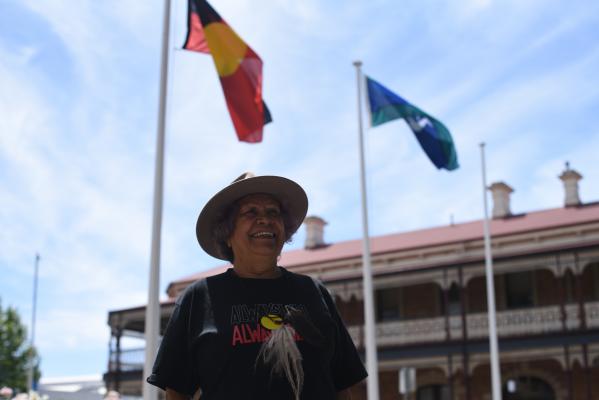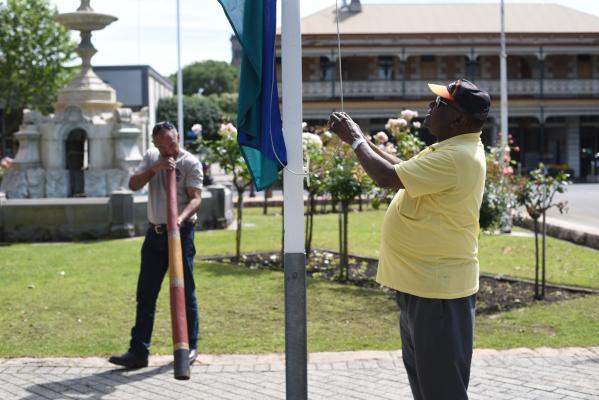
Brett Kennedy
MOUNT Gambier “always was, always will be” home to the Boandik people, a deep-rooted connection being celebrated during NAIDOC Week.
The national 2020 celebration of First Nation people may have shifted from July to November due to COVID-19 but its significance to celebrating one of the world’s oldest known cultures remains.
For Boandik elder Aunty Penny Bonney, who helped launched NAIDOC Week with a flag-raising ceremony in Mount Gambier on Monday, it is a time to honour the past while building towards the future.
“It’s about recognising our ancestors, our First Nations people that roamed this beautiful country,” Aunty Penny said.
While a march down Commercial Street did not occur this year due to coronavirus restrictions, Aunty Penny expressed pride in how the community embraced its First Nations heritage.
This includes the potential naming of Mount Gambier’s landmark multi-million dollar community and recreation hub with a Bunganditj word, the reclaimed language of Boandik peoples.
Wulanda – meaning enjoy or cherish – and Berrin – meaning Mount Gambier – are among the suggestions currently under public consideration through a Mount Gambier City Council survey.
Aunty Penny said the use of Bunganditj language in public signage and naming was “a wonderful thing”, hoping to see it more widely adopted through consultation with First Nations people.
“It is about time this is happening because the wider community needs to know this is Boandik country,” Aunty Penny said.
“Australia is aboriginal land, there were names and places before any colonisation.”
The use of the Bunganditj language to showcase the district’s heritage is one element of council’s inaugural Reconciliation Action Plan (RAP), released in June, which incorporates almost 80 deliverables to help achieve a shared vision for reconciliation.
The plan, entitled Yerkalalpata – meaning leading the way in Bunganditj – is focused on creating a society free from racism and prejudice, a city which supports expressions of cultural identify and a community characterised by social justice.
“This is about reconciliation, building good communication and good between the Indigenous community and non-Aboriginal people,” Aunty Penny said.
Burrandies Corporation chief executive Robyn Campbell spoke at Monday’s mayoral reception at City Hall, celebrating Australia’s first explorers, navigators, farmers, scientists, diplomats and artists.
“Each year NAIDOC Week acknowledges and celebrates that our nation’s story didn’t begin with the documented European contact, whether in 1770 or 1601 with the arrival of the Dutch on the western coast of Cape York Peninsula,” Ms Campbell said.
“With the arrival of the first settlers brought destruction to our First Nations people’s culture and language.
“Language holds the key to our First Nations people’s history and is linked to our cultural and spiritual identity.
“We also want all Australians to understand the pain and suffering our ancestors were subjected to and the impacts of colonisation, and to now walk together hand in hand with a shared understanding for a brighter future for us all.”
Helping to guide that future vision for the region will be the newly-formed Yerkalalpata Reconciliation Action Plan Reference Group, which will help guide council’s ongoing delivery of the plan.
Mount Gambier Mayor Lynette Martin said the group would include senior staff from council, Pangula Mannamurna and Burrandies, as well as Elders Aunty Penny Bonney, Aunty Val Brennan and Uncle Mikey Hartman and First Nations community members Michelle Jacquelin-Furr, Mark Lovett and Belinda Bonney.
“We are eager to lead by example in this space within our community,” Mayor Martin said.
Member for Barker Tony Pasin urged the community to learn more about local Indigenous cultures and share in the traditions that make Australia unique.
“We are privileged to have one of the world’s oldest continuous cultures and through NAIDOC events we can share in this proud history and contemplate our future.”
NAIDOC Week 2020 – which carries the theme “Always was, Always will be” – continues until November 15.
Visit www.naidoc.org.au for more information or to view events across the Limestone Coast.








